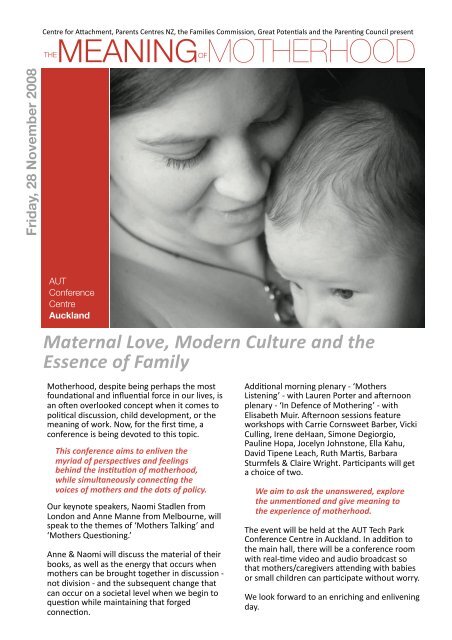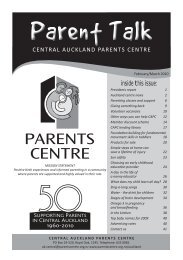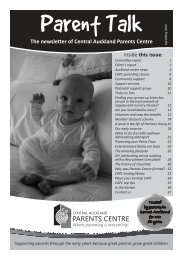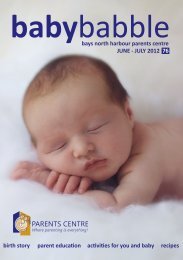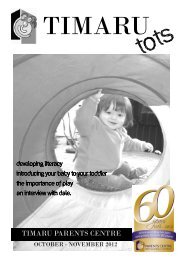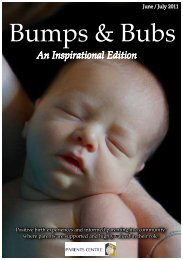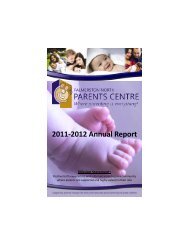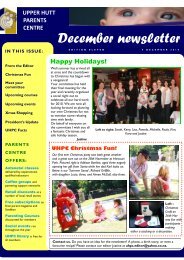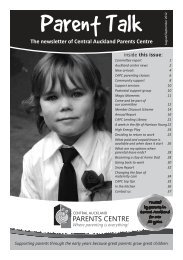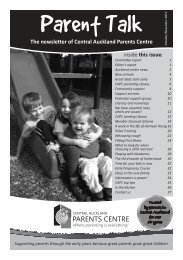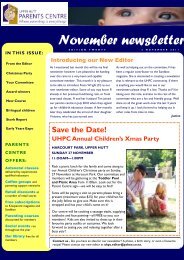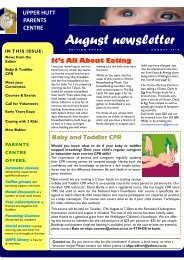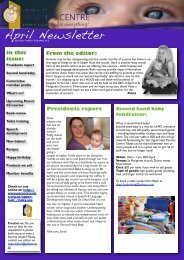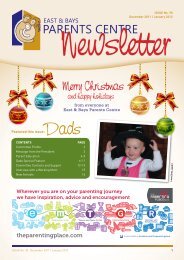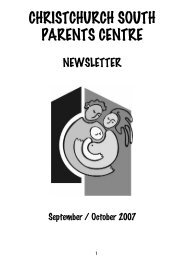Motherhood Flyer - Parents Centres New Zealand Inc
Motherhood Flyer - Parents Centres New Zealand Inc
Motherhood Flyer - Parents Centres New Zealand Inc
You also want an ePaper? Increase the reach of your titles
YUMPU automatically turns print PDFs into web optimized ePapers that Google loves.
Centre for AYachment, <strong>Parents</strong> <strong>Centres</strong> NZ, the Families Commission, Great Poten4als and the Paren4ng Council present<br />
THEMEANINGOFMOTHERHOOD<br />
Friday, 28 November 2008<br />
AUT<br />
Conference<br />
Centre<br />
Auckland<br />
Maternal Love, Modern Culture and the<br />
Essence of Family<br />
<strong>Motherhood</strong>, despite being perhaps the most<br />
founda4onal and influen4al force in our lives, is<br />
an o9en overlooked concept when it comes to<br />
poli4cal discussion, child development, or the<br />
meaning of work. Now, for the first 4me, a<br />
conference is being devoted to this topic.<br />
This conference aims to enliven the<br />
myriad of perspec;ves and feelings<br />
behind the ins;tu;on of motherhood,<br />
while simultaneously connec;ng the<br />
voices of mothers and the dots of policy.<br />
Our keynote speakers, Naomi Stadlen from<br />
London and Anne Manne from Melbourne, will<br />
speak to the themes of ‘Mothers Talking’ and<br />
‘Mothers Ques4oning.’<br />
Anne & Naomi will discuss the material of their<br />
books, as well as the energy that occurs when<br />
mothers can be brought together in discussion ‐<br />
not division ‐ and the subsequent change that<br />
can occur on a societal level when we begin to<br />
ques4on while maintaining that forged<br />
connec4on.<br />
Addi4onal morning plenary ‐ ‘Mothers<br />
Listening’ ‐ with Lauren Porter and a9ernoon<br />
plenary ‐ ‘In Defence of Mothering’ ‐ with<br />
Elisabeth Muir. A9ernoon sessions feature<br />
workshops with Carrie Cornsweet Barber, Vicki<br />
Culling, Irene deHaan, Simone Degiorgio,<br />
Pauline Hopa, Jocelyn Johnstone, Ella Kahu,<br />
David Tipene Leach, Ruth Mar4s, Barbara<br />
Sturmfels & Claire Wright. Par4cipants will get<br />
a choice of two.<br />
We aim to ask the unanswered, explore<br />
the unmen;oned and give meaning to<br />
the experience of motherhood.<br />
The event will be held at the AUT Tech Park<br />
Conference Centre in Auckland. In addi4on to<br />
the main hall, there will be a conference room<br />
with real‐4me video and audio broadcast so<br />
that mothers/caregivers aYending with babies<br />
or small children can par4cipate without worry.<br />
We look forward to an enriching and enlivening<br />
day.
MEANINGMOTHERHOOD 28 November 2008<br />
“It is as if one steps back across a threshold<br />
into a different world with different values, a<br />
different universe. everything that is a<br />
priority in the other, parallel universe is<br />
reversed, turned upside down. The centre of<br />
life in one world ‐ children ‐ is invisible to the<br />
other. There is no shared language. The most<br />
important, meaningful ‘work’ I had ever done<br />
counted for nothing.”<br />
Anne Manne<br />
Programme<br />
8:30 ‐ 9:00 Powhiri & Opening Words<br />
9:00 ‐ 10:00 Naomi Stadlen, “Mothers Talking”<br />
10:00 ‐ 10:30 Morning Tea<br />
10:30 ‐ 11:30 Anne Manne, “Mothers Ques4oning”<br />
11:30 ‐ 12:15 Lauren Porter, “Mothers Listening”<br />
12:15 ‐ 1:15 Lunch<br />
1:15 ‐ 2:45 A9ernoon Workshops *<br />
2:45 ‐ 3:15 A9ernoon Tea<br />
3:15 ‐ 4:00 Elisabeth Muir, “In Defence of Mothering”<br />
4:00 ‐ 4:45 Anne Manne & Naomi Stadlen, ‘What We’ve Learning from Mothering”<br />
Registra4on desk opens at 7:30am.<br />
*A9ernoon workshops will be a choice of two 45‐minute workshops, grouped together in pairs. Workshop choices<br />
will be filled according to the order of registra4ons received.<br />
All plenary sessions taking place in the main room will be simultaneously broadcast (video and audio) in an<br />
adjacent room so that mothers aYending with babies or small children can listen without worry.
MEANINGMOTHERHOOD 28 November 2008<br />
Naomi Stadlen<br />
Psychotherapist,<br />
Counsellor and Author of<br />
What Mothers Do...<br />
Especially when it looks<br />
like nothing<br />
Anne Manne<br />
Journalist, Social<br />
Philosopher and Author<br />
of <strong>Motherhood</strong>: How<br />
should we care for our<br />
children?<br />
Keynote Speakers<br />
Anne Manne & Naomi Stadlen<br />
Naomi Stadlen<br />
Naomi's life turned out very differently from<br />
the way she thought it would. She thought<br />
she would work very hard and create a<br />
successful career. However, mee4ng her<br />
husband and having three children changed<br />
her values. Family life was wonderful, yet she<br />
o9en felt disrespected as a mother by the<br />
culture in which she lived. When her children<br />
were older, she became a La Leche League<br />
leader. She started Mothers Talking in 1991 ‐<br />
a weekly discussion groups for mothers in<br />
London to explore how it feels to become a<br />
mother. She became an existen4al<br />
psychotherapist, and specialises in working<br />
with individual mothers, or parents. She<br />
teaches courses on family rela4onships. She<br />
also teach Wu Style Tai Chi to mothers.<br />
Eventually, she wrote What Mothers Do –<br />
Especially When It Looks Like Nothing (2004).<br />
It's a study of what she has seen many<br />
mothers do without giving advice on what<br />
any mother ‘ought’ to do. Publishers assured<br />
her that mothers would not buy a book that<br />
gave no advice ‐ but mothers have proved<br />
these publishers wrong. Naomi was moved to<br />
discover how many mothers have felt<br />
supported by reading about other mothers.<br />
She is now a grandmother. She loves listening<br />
to mothers talking because she believes that<br />
there is much more to learn about what<br />
mothers do.<br />
Anne Manne<br />
In so many women’s lives there is a Before<br />
and A9er <strong>Motherhood</strong>. Anne is no different.<br />
Before having children and caring for them<br />
“If we see ‘nothing’ when we look at a mother<br />
who is quietly being a mother, it is easy for her to<br />
feel as if she is doing nothing too. If she thinks<br />
she is doing nothing, and we think she is doing<br />
nothing, there is only the speechless baby to<br />
experience how much good she is doing.”<br />
Naomi Stadlen<br />
for many years, Anne taught in the Poli4cs<br />
Departments of Melbourne and Latrobe<br />
Universi4es. A9er motherhood, her direc4on<br />
and interests changed. When her youngest<br />
went to school, she began wri4ng full 4me.<br />
Rather than being “the enemy of promise,”<br />
the pram in the hall, while delaying things,<br />
nonetheless proved to be an inspira4on for<br />
reflec4on and crea4ve endeavour. Now a<br />
respected social commentator, she has been<br />
a regular columnist for The Australian and<br />
The Age, while her longer essays on varied<br />
and vexed aspects of contemporary life, can<br />
be found in The Monthly, The Australian<br />
Literary Review and The Age. She has a<br />
special interest in family issues and children,<br />
and is a strong advocate of suppor4ng the<br />
resources and capabili4es of parents. Anne<br />
has long grappled with the ques4on; how can<br />
we give women and mothers in par4cular, a<br />
beYer deal in society without short‐changing<br />
children? Her book <strong>Motherhood</strong>: How should<br />
we care for our children was a finalist in the<br />
Walkley Award for Best Non‐Fic4on Book of<br />
2006. She is a contributor to Dear Mr Rudd,<br />
to be published March 2008, and is the<br />
author of the March 2008 Quarterly Essay<br />
Love and Money. She is a mother of two adult<br />
daughters.<br />
Family life is being<br />
reshaped by the<br />
new economy.<br />
Although it is<br />
rarely made<br />
explicit, the new<br />
capitalism is<br />
con4ngent on a<br />
trade‐off: higher<br />
produc4vity is<br />
translated not into<br />
more 4me at<br />
home but more<br />
hours worked per<br />
family per year to<br />
service our<br />
consump4on<br />
habit.<br />
Anne Manne
MEANINGMOTHERHOOD 28 November 2008<br />
Afternoon Workshops<br />
Exploring <strong>Motherhood</strong>*<br />
* Each conference parEcipant will choose two workshops<br />
Workshop 1:<br />
Am I S;ll a Mother? Making Meaning of <strong>Motherhood</strong><br />
AIer the Death of a Baby<br />
Vicki Culling & Claire Wright<br />
Pregnancy, as a rite of passage, has a liminal status that<br />
places women between two structural states ‐ that of<br />
before and a9er the arrival of the child. We will discuss<br />
the absence of one group of mothers who remain<br />
suspended between those two states ‐ neither<br />
expec4ng their child nor having them biologically<br />
present. What becomes of these mothers? Do they<br />
have the right to be called mothers if the way we<br />
construct motherhood is based on the presence of<br />
children? What language is available to those mothers<br />
in terms of voicing their experience and claiming<br />
themselves as mothers? Almost all of the literature<br />
that focuses on motherhood goes on to discuss the role<br />
of children in the maintenance of iden4ty, on dominant<br />
motherhood ideologies ('good mother' versus 'bad<br />
mother') and myths of motherhood. Some4mes there<br />
are references to those that fall outside the dominant<br />
model ‐ the teenage mothers, single mothers, lesbian<br />
mothers. Nowhere is there any discussion about the<br />
babyless/childless mother. We want to start such a<br />
discussion. We will draw upon the experiences of<br />
different mothers whose children have died ‐ mothers<br />
who have no living children, mothers whose first born/<br />
children died and now have subsequent living children,<br />
mothers who had living children and whose<br />
subsequent baby/child died.<br />
Workshop 2:<br />
Who Are Teen Mothers? We Know Who We Are!<br />
Ruth MarEs<br />
Teenage pregnancies have become an issue of<br />
increasing concern in Aotearoa/<strong>New</strong> <strong>Zealand</strong>. Currently<br />
If an expectant mother walked into a library and asked,<br />
‘How will my baby develop?’ the librarian could show<br />
her some books on infant development. If, however,<br />
she asked, ‘What about me? How will I develop as a<br />
mother?’ the librarian would probably look surprised.<br />
The idea that mothers develop isn’t a common subject<br />
for a book. Almost the opposite. Many people seem<br />
to think that mothers risk stagnating. Especially if a<br />
mother isn’t out at work, people assume she must be<br />
‘stuck’ at home doing boring and repetitive chores with<br />
little to stimulate her.’<br />
Naomi Stadlen<br />
we have the second highest teenage pregnancy rate in<br />
the developed world. Young teenage women who are<br />
pregnant o9en do not seek early antenatal care for a<br />
variety of reasons and are unlikely to breasteed their<br />
babies. They feel isolated and judged in our society. In<br />
the 2002 Maternity Services Consumer Survey, women<br />
aged 15‐19 were less likely than older mothers to have<br />
been sa4sfied with maternity services. Yet, the truth is,<br />
if we would listen to their voices we would discover<br />
what motherhood means to these young women, how<br />
motherhood is constructed via their experiences and<br />
what iden4fied support could assist them in their<br />
journey to motherhood. The presenta4on will cover<br />
some <strong>New</strong> <strong>Zealand</strong> sta4s4cs of teenage pregnancies<br />
and explore needs and issues that might surround and<br />
affect teenage mothering through a visual presenta4on<br />
of research on a small sample of teenage mother’s<br />
stories and subsequent thema4c extrac4ons.<br />
Workshop 3:<br />
Journey Home: Adop;ve Mothers and the Meaning of<br />
<strong>Motherhood</strong><br />
Jocelyn Johnstone<br />
My Masters thesis described the experiences of<br />
adop4ve mother’s and fathers in ways they sought to<br />
build a paren4ng and aYachment rela4onship with<br />
their adop4ve children from an orphanage in Russia. It<br />
explored factors that facilitated and hindered the<br />
rela4onship from an aYachment developmental<br />
perspec4ve. The research used a phenomenological<br />
approach which aimed to hear mothers’ stories.<br />
Research methods included ques4onnaires, focus<br />
groups and in‐depth interviews. Adop4ve mothers<br />
shared of their transi4ons from that of being a working<br />
mother to a mother at home with their new adop4ve<br />
children. These encompassed the ongoing transi4ons<br />
from the grief of not having their own biological<br />
children, to the decision to adopt, to the prepara4on<br />
process, followed by the subsequent phone call and<br />
trip/s to Russia. The process of becoming a mother<br />
from the first mee4ng of their children in the<br />
orphanage required an enormous commitment,<br />
adapta4on and resilience from these women. Their<br />
stories are inspira4onal and we can all learn from<br />
them. The workshop will focus on the meaning of<br />
motherhood from an adop4ve mother's perspec4ve,<br />
how she makes meaning of this role, her journey to<br />
motherhood and the ongoing mothering rela4onship in<br />
her iden4ty?
MEANINGMOTHERHOOD 28 November 2008<br />
Afternoon Workshops<br />
continued<br />
Workshop 4:<br />
Both Mother and Worker: Conflic;ng Construc;ons in<br />
Government Policy and Women’s Talk<br />
Ella Kahu<br />
Government policy influences lives not just materially,<br />
but also ideologically through the promo4on of certain<br />
discourses. A Ministry of Women’s Affairs policy and<br />
the talk of two focus groups of first 4me mothers were<br />
cri4cally analysed to explore their differing<br />
understandings of what it means to be a mother and a<br />
worker. Deploying an economic ra4onalist discourse,<br />
the policy constructs motherhood as an inevitable but<br />
invisible demand, and paid work as essen4al to wellbeing<br />
and a duty of ci4zenship. The policy, driven by<br />
capitalist goals of economic growth rather than the<br />
needs of women, marginalises motherhood and<br />
posi4ons women as workers first and foremost. In<br />
contrast, the mothers deployed an intensive mother<br />
discourse which privileged their maternal role and<br />
posi4oned them as the natural and best caregivers of<br />
their children. However, the pressure of increasingly<br />
dominant discourses that construct mothering as<br />
worthless and paid work as essen4al manifested in the<br />
women’s talk as guilt and conflict. This tension is<br />
managed in part by the evolving independent mother<br />
discourse which strives to enable a more comfortable<br />
weaving of the iden44es of mother and worker.<br />
Workshop 5:<br />
Becoming a Mother: Doubt, Joy & Other Stops Along<br />
the Way<br />
Carrie Cornsweet Barber & Simone DeGiorgio<br />
The experience of becoming a mother is one of the<br />
most profound transforma4ons in women’s lives, and<br />
it can be a period of crea4vity, fear, renewal, stress, joy,<br />
isola4on, and/or a mixture of all of the above, and<br />
more. A variety of social and individual factors may<br />
influence how women weather this transi4on and how<br />
their view of motherhood ‐ and themselves ‐ is created.<br />
This workshop will start from our experiences as<br />
facilitators and confidants of mothers’ groups and<br />
individual mothers, trying to understand the needs and<br />
struggles of families as they grow. We will also discuss<br />
the findings of an exploratory study of the experiences<br />
of mothers and fathers in Hamilton, <strong>New</strong> <strong>Zealand</strong>, and<br />
their views on the kinds of supports and services that<br />
families need.<br />
Workshop 6:<br />
Becoming through Breas\eeding: The Role of<br />
Breas\eeding in Construc;ng Maternal Iden;ty<br />
Barbara Sturmfels<br />
Much has been said ‐ and indeed best prac4se is now<br />
based on ‐ mother’s milk as the best start in life for<br />
baby. What is much less explored is the rela4onal side<br />
of breasteeding and the poten4ally transforma4ve<br />
impact on maternal iden4ty. This workshop will<br />
inves4gate how breasteeding helps a woman form an<br />
iden4ty as mother, influences her rela4onship with her<br />
child, affects a woman’s sense of her body and her<br />
feelings of worth,and how breasteeding can also<br />
create a transforma4on toward healing. By discussing<br />
how breasteeding is experienced and perceived from<br />
the woman’s perspec4ve, this workshop will elucidate<br />
how the process of becoming a mother is deeply linked<br />
to the act of breasteeding.<br />
Workshop 7:<br />
Maoriness and <strong>Motherhood</strong>: The Wahakura as<br />
Exchange of Knowledge<br />
David Tipene‐Leach & Pauline Hopa<br />
The wahakura is a woven harakeke bassinet designed<br />
as an aid to safe bedsharing. It represents not only a<br />
device for safe shared sleep, but an expression of<br />
4kanga Maori and an exchange of that custom from<br />
one genera4on to the next. It also promotes<br />
breasteeding and bonding. Maori SIDS rates have<br />
fallen tremendously over the past 15 years. It is the<br />
number of deaths that touch the heart and,<br />
gra4fyingly, these have reduced from around 115 to 45.<br />
The present problem is that those figures seem to be<br />
stable with liYle inclina4on to decrease. Presumably,<br />
we have reached the natural end of the decline from<br />
health promo4on efforts. The 4me has now come to<br />
adopt an approach consistent with all the interna4onal<br />
advice around safe sleeping environments ‐an<br />
approach that is at one with 4kanga Maori. The<br />
wahakura has been adopted by Maori mums because<br />
of its ‘Maoriness’ as it reflects 4me honoured custom<br />
around shared sleep between mother and baby and<br />
helps to reflect the goodness of Maori mothering. It<br />
also promises to mi4gate much of the risk of the<br />
shared sleeping environment for the infant of the<br />
mother who smoked during pregnancy, whilst<br />
preserving the valued cosleeping behaviour.<br />
Workshop 8:<br />
A Good Start: Resilience and First‐Time <strong>Motherhood</strong><br />
Irene deHaan<br />
Women having a first baby must deal with a completely<br />
new set of physical and emo4onal challenges over<br />
which they have liYle or no control. These challenges<br />
include the discomforts of pregnancy; the birth itself;<br />
and the hormonal upsets, 4redness and self‐doubt<br />
common in the early postnatal period. Although<br />
accepted as ‘normal’, none of this is easy. Nor does<br />
competent infant care necessarily ‘come naturally’.<br />
People close to a new mother, her partner especially,<br />
also face major change: there can be significant effects<br />
on rela4onships. The birth of a first baby, however<br />
welcome, is a significant life change requiring rapid<br />
adapta4on to new and surprisingly difficult<br />
circumstances.<br />
This presenta4on describes the experience of<br />
becoming a mother in the words of women who were<br />
par4cipants in a qualita4ve study of resilience in<br />
families having a first baby. Themes covered in the<br />
presenta4on include preparing for motherhood;<br />
‘mee4ng the baby’, learning new skills; and confron4ng<br />
the reali4es of life with a baby. This laYer theme<br />
includes physical effects and gewng used to ‘the<br />
constantness of it’ as well as experiences of effects on<br />
close rela4onships, including the impact of<br />
motherhood on their sense of iden4ty and role and the<br />
decision making about whether or not to go back to<br />
work.
MEANINGMOTHERHOOD 28 November 2008<br />
Other Speakers &<br />
Invited Guests<br />
Carrie Cornsweet Barber<br />
(Workshop 5:<br />
Becoming a Mother: Doubt, Joy &<br />
Other Stops Along the Way)<br />
Carrie is the mother of two and a<br />
child clinical psychologist who has<br />
specialised in working with women<br />
in the transi4on to motherhood.<br />
Prior to moving to <strong>New</strong> <strong>Zealand</strong> she<br />
lead a support group for new<br />
mothers called Finding the Joy, in<br />
addi4on to teaching and<br />
researching. She is currently<br />
teaching at the University of<br />
Waikato Psychology Department<br />
and researching the support and<br />
services available for mothers and<br />
families in <strong>New</strong> <strong>Zealand</strong>.<br />
Vicki Culling<br />
(Workshop 1:<br />
Am I S;ll a Mother? Making Meaning<br />
of <strong>Motherhood</strong> AIer the Death of a<br />
Baby)<br />
Vicki Culling lives in Wellington and<br />
works in the field of perinatal death<br />
support and informa4on. She is the<br />
current Chairperson of Sands <strong>New</strong><br />
<strong>Zealand</strong> and worked as Sands NZ’s<br />
first full 4me worker in 2006 thanks<br />
to a Vodafone NZ World of<br />
Difference award. Vicki’s daughter<br />
Aster died in 1998 at 42 weeks, just<br />
prior to birth. Vicki’s second<br />
daughter, Phoebe, is nine years old.<br />
Simone DeGiorgio<br />
(Workshop 5:<br />
Becoming a Mother: Doubt, Joy &<br />
Other Stops Along the Way)<br />
Simone is a mother of three and<br />
Childbirth Educator with exper4se<br />
in the transi4on from birth to<br />
parenthood. Since becoming a<br />
Childbirth Educator in 2002, Simone<br />
has focused on providing support<br />
and educa4on for new parents.<br />
Simone launched the support<br />
service Maternal Journey in 2007,<br />
offering women and their families<br />
courses, workshops and one‐onone<br />
support through pregnancy,<br />
birth and beyond, with a focus on<br />
feeding, sleeping and<br />
developmental understanding from<br />
birth to five.<br />
www.maternaljourney.co.nz<br />
Irene deHaan<br />
(Workshop 8:<br />
A Good Start: Resilience and First‐Time<br />
<strong>Motherhood</strong>)<br />
Irene is the mother of three older<br />
children and the Principal<br />
Community Rela4ons Advisor at the<br />
Families Commission. Born in<br />
Glasgow, she immigrated to <strong>New</strong><br />
<strong>Zealand</strong> in 1986 and has worked at<br />
the Women’s Resource Centre in<br />
Warkworth and as Manager of the<br />
Homebuilders Family Support. She<br />
is currently comple4ng a doctorate<br />
on resilience in families with a first<br />
baby.<br />
Pauline Hopa<br />
(Workshop 7:<br />
Maoriness and <strong>Motherhood</strong>: The<br />
Wahakura as Exchange of Knowledge )<br />
Pauline is the Opera4ons Manager<br />
for Maori SIDS; she is of Nga4<br />
Whatua and Ngapuhi descent.<br />
She currently holds posi4ons on the<br />
<strong>New</strong> <strong>Zealand</strong> Breasteeding<br />
Authority, Te Mata4ni – Aotearoa<br />
Tradi4onal Maori Performing Arts<br />
Society, and the Waitangi Cultural<br />
CommiYee.Pauline has a Masters of<br />
Management from the University of<br />
Auckland and a Graduate Diploma<br />
of Business. Her interests are in<br />
Maori performing arts, kapa haka,<br />
and sustainable development and<br />
the empowerment of whanau to<br />
live healthy happy lives is the vision<br />
Pauline is commiYed to working<br />
towards.<br />
We can and do, individually<br />
and collectively, dismiss as<br />
unimportant the links<br />
between experience and<br />
emotion, self and feeling,<br />
between past and present,<br />
young and old, birth and<br />
death, between infant and<br />
adult. One example is the<br />
minimising of the critical<br />
importance for the infant of<br />
his relationship with his<br />
mother. There is an inference<br />
that infants can get as much,<br />
if not more, from professional<br />
caregivers. The word mother<br />
is gradually being replaced by<br />
the word caregiver as if<br />
mother and caregiver are, or<br />
can be, one and the<br />
same,that there is no<br />
difference between them.<br />
Elisabeth Muir<br />
Jocelyn Johnstone<br />
(Workshop 3:<br />
Journey Home: Adop;ve Mothers and<br />
the Meaning of <strong>Motherhood</strong> )<br />
Jocelyn is Plunket Educator/Advisor<br />
and a counsellor in private prac4ce.<br />
She recently completed her<br />
Masters thesis exploring the<br />
aYachment journey of adop4ve<br />
parents of Russian children. Her<br />
philosophical framework is<br />
aYachment and focuses on the<br />
need for a responsive and secure<br />
rela4onship with a primary<br />
aYachment figure, generally the<br />
mother.<br />
Ella Kahu<br />
(Workshop 4:<br />
Both Mother and Worker: Conflic;ng<br />
Construc;ons in Government Policy<br />
and Women’s Talk )<br />
Ella is the mother of two, a long‐<br />
4me member of HuY Playcentre<br />
Assn and recently completed her<br />
masters thesis in Psychology on the<br />
discursive impact of government<br />
policy on women’s lives and<br />
choices. She teaches psychology at<br />
Massey University i Wellington and<br />
is a member of the SPACE Advisory<br />
Board.
MEANINGMOTHERHOOD 28 November 2008<br />
Other Speakers &<br />
Invited Guests<br />
continued...<br />
David Tipene Leach<br />
(Workshop 7:<br />
Maoriness and <strong>Motherhood</strong>: The<br />
Wahakura as Exchange of Knowledge)<br />
Well experienced in solo and rural<br />
general prac4ce and qualified in<br />
public health, David is fluent in<br />
Maori custom and language and<br />
ac4ve in Maori health<br />
development. David has a history of<br />
pa4ent care, community service,<br />
academic teaching, public health<br />
service provision and health<br />
research. Those interests have all<br />
been employed in my associa4on<br />
with the Maori SIDS Preven4on<br />
Team from 1993 to 2000 and more<br />
recently with the Wahakura Project.<br />
He is presently working as a General<br />
Prac44oner for Hauora Heretanga,<br />
the primary health care clinic at the<br />
Taiwhenua o Heretaunga in<br />
Has4ngs and also has some public<br />
health contractual work in diabetes<br />
preven4on. The Wahakura Project is<br />
his present passion.<br />
Ruth MarWs<br />
(Workshop 2:<br />
Who Are Teen Mothers? We Know<br />
Who We Are!)<br />
A midwife for over 25 years who has<br />
worked in a variety of sewngs, Ruth<br />
has recently come to live in<br />
Christchurch. She has a passion for<br />
pregnant teenagers and is involved<br />
with teenage antenatal educa4on,<br />
as well as teaching in the midwifery<br />
programme at Christchurch<br />
Polytechnic Ins4tute of Technology.<br />
For the last four years Ruth has<br />
been a regular feature author for<br />
Kiwi Parent on Teen Talk. She also<br />
set up the first teenage antenatal<br />
and postnatal support groups in the<br />
Manawatu called ‘Youth Plus’. In<br />
her spare 4me Ruth enjoys being a<br />
‘bike chick’ riding with her husband.<br />
Elisabeth Muir<br />
(Plenary Address: In Defence<br />
of Mothering)<br />
Elisabeth Muir is an Otago<br />
University trained Child<br />
Psychotherapist who has worked<br />
with children and families for nearly<br />
thirty years in both <strong>New</strong> <strong>Zealand</strong><br />
and Canada. During the past fi9een<br />
years her focus has centred on<br />
working with infants and toddlers<br />
and their families. She has recently<br />
returned from twelve years in<br />
Toronto, Canada. While in Toronto<br />
she worked in the Infant and Family<br />
Programme at the Hincks Centre.<br />
During this 4me she ini4ated and<br />
was co‐principal inves4gator in a<br />
research study comparing two<br />
parent‐infant interven4ons which<br />
included an infant‐led interven4on<br />
called Watch, Wait and Wonder. She<br />
has published interna4onally,<br />
presented her work and done<br />
training workshops in Europe,<br />
Canada, United States, and<br />
Australia. Her primary goal when<br />
intervening with infants and their<br />
families is to foster a confident,<br />
flexible and interac4onally rich<br />
rela4onship between mothers and<br />
their infants, toddlers and young<br />
children. Elisabeth is currently<br />
semi‐re4red and doing clinical<br />
supervision in Christchurch.<br />
Lauren Porter<br />
(Plenary Address: Mothers Listening)<br />
Lauren is the mother of two young<br />
children and the Co‐Director of the<br />
Centre for AYachment. In both her<br />
personal and professional life she<br />
has been struck by the profound<br />
importance of mothering and<br />
simultaneous the absence of<br />
support for motherhood. The<br />
rela4onal model of development<br />
described by aYachment theory<br />
and neuroscience underpin her<br />
professional efforts. She is a regular<br />
speaker at conferences around<br />
Australia and <strong>New</strong> <strong>Zealand</strong> and has<br />
wriYen for publica4ons in both<br />
countries, as well as the US.<br />
Barbara Sturmfels<br />
(Workshop 6:<br />
Becoming through Breas\eeding:<br />
What Breas\eeding Means to<br />
Maternal Iden;ty)<br />
Barbara Sturmfels is the Director of<br />
La Leche League <strong>New</strong> <strong>Zealand</strong>. She<br />
has been an LLL Leader in Central<br />
Auckland since 1996. She and her<br />
partner Bill have two children aged<br />
17 and 13. Barbara is also a<br />
member of the Na4onal<br />
Breasteeding Advisory CommiYee.<br />
Prior to having children, Barbara<br />
gained degrees in economics and<br />
sta4s4cs and worked in the<br />
banking, educa4on and public<br />
transport sectors. She has been<br />
largely out of the paid workforce for<br />
the last 17 years, during which 4me<br />
she has gained more skills and<br />
knowledge, with more relevance<br />
and benefit to the community, than<br />
would have ever been possible in<br />
her previous corporate<br />
employment.<br />
Claire Wright<br />
((Workshop 1:<br />
Am I S;ll a Mother? Making Meaning<br />
of <strong>Motherhood</strong> AIer the Death of a<br />
Baby)<br />
Claire Wright lives in Auckland and<br />
is mother to four children ‐ Isabelle,<br />
Phoebe, Daniel and Zoe. Her first<br />
three children are not living, and<br />
Zoe is 22 months old. Claire works<br />
4relessly for Sands, both locally and<br />
na4onally, and is an incredibly<br />
talented and ar4culate parent who<br />
works on behalf of other bereaved<br />
parents in a voluntary (and o9en<br />
thankless) role. Sands NZ and Sands<br />
Auckland Central are lucky to have<br />
her energy and skills.
MEANINGMOTHERHOOD 28 November 2008<br />
Cost<br />
$195 per person, includes morning tea, a9ernoon<br />
tea and lunch. Student and hardship rates<br />
available.<br />
Venue<br />
AUT Tech Park Conference Centre<br />
The conference will be held at the AUT Tech Park<br />
Conference Centre at 585 Great South Road,<br />
Penrose, Auckland.<br />
HOW TO FIND THE CONFERENCE CENTRE FROM THE CITY<br />
! Take the Penrose / Ellerslie Panmure Highway exit from the Southern Motorway<br />
! Follow the road around to the right, taking the turnoff to Penrose<br />
! There will be a Caltex Petrol Station on your left as you meet Great South Road<br />
Parking is available at the venue as well as nearby.<br />
! Keep to the left at large intersection (Effective Fencing is on the corner) go over the railway lines (this is still Great South Road)<br />
! AUT (the old Fletchers complex of buildings) comes up just after the intersection with Penrose Road<br />
! Just past this intersection you will turn right into AUT Technology Park.<br />
Please see map and direc4ons for further<br />
! Parking is available by taking the first driveway on the right past the Penrose Road lights (AUT Technology Park), drive down<br />
the side of the building–follow the arrows to The Conference Centre Car parking on the rooftop.<br />
! If this carpark is full there is carparking available in Holloway Place – directly across the road from the complex entrance or<br />
informa4on.<br />
along Great South Road - turn to the left when leaving the complex<br />
! The Conference Centre is situated on the Ground Floor, Wright Stephenson House, 585 Great South Road, Penrose<br />
(Phone 921 9599)<br />
! From the car park enter Wright Stephenson House where The Conference Centre entrance is. Take the lift to the ground floor.<br />
! Public Transport: Train and bus timetables refer to: www.maxx.co.nz<br />
Additional parking is available in<br />
Holloway Place opposite our<br />
main entrance, or on Great South Road.<br />
Carparking is<br />
located on the<br />
rooftop carpark<br />
and is subject<br />
to availability.<br />
Confirmation of Registration<br />
All online registra4ons receive an automa4callygenerated<br />
confirma4on that you have registered.<br />
Registra4ons done by post or fax will receive<br />
individual email confirma4ons once processed. If<br />
you do not receive confirma4on of your<br />
registra4on, please follow up to make sure it was<br />
received.<br />
Registra4ons are not considered complete un4l<br />
payment has been made.<br />
Displays & Info<br />
A variety of community agencies, programmes<br />
and ar4sts whose work supports motherhood will<br />
have display tables at the venue. This includes<br />
SKIP, Jumping Beans, Infant Mental Health<br />
Associa4on Aotearoa <strong>New</strong> <strong>Zealand</strong>, SPACE/<br />
Playcentre and the Wahakura Project.<br />
Questions / Enquiries<br />
All registra4ons, ques4ons and requests should be<br />
directed to Lauren Porter, Conference Convener,<br />
Centre for AYachment at<br />
Lauren@centreforaYachment.com or 021 721<br />
115.<br />
Sponsors<br />
The conference is being jointly sponsored by the<br />
Centre for AYachment, the Families Commission,<br />
<strong>Parents</strong> <strong>Centres</strong> NZ, Great Poten4als and the NZ<br />
Paren4ng Council. Without the support of these<br />
wonderful agencies and organisa4ons this<br />
conference would not be possible. Our heartelt<br />
thanks to all.
RegistraWon Form<br />
Meaning of <strong>Motherhood</strong> Conference: Friday 28 November 2008<br />
8:30 am un4l 5:00 pm<br />
Auckland, AUT Conference Centre<br />
Cost: $195 per person, including morning tea, a9ernoon tea & lunch (Student and Hardship rates available)<br />
Name: ________________________________________________________<br />
Organisa4on: __________________________________________________<br />
Postal Address: _________________________________________________<br />
City: ___________________________ Post Code: ____________________<br />
Contact Phone: ________________________________<br />
Email: ___________________________<br />
Workshop Choices:<br />
Please put a number “1” in the box next to your first choice, a “2” next to your second choice and a “3” next to your<br />
third choice. We will aYempt to give you your top 2 choices, but as workshops will be filled on a first in‐first served<br />
basis, the 3rd choice will be given in the event that one of your top two are no longer available.<br />
Workshop 1 (Vicki Culling/Claire Wright)<br />
Workshop 2 (Ruth Mar4s)<br />
Workshop 3 (Jocelyn Johnstone)<br />
Workshop 4 (Ella Kahu)<br />
Workshop 5 (Carrie Cornsweet Barber & Simone DeGiorgio)<br />
Workshop 6 (Barbara Sturmfels)<br />
Workshop 7 (David Tipene‐Leach & Pauline Hopa)<br />
Workshop 8 (Irene deHaan)<br />
Please remember to print clearly so we can contact you efficiently.<br />
Please indicate method of payment:<br />
I enclose a cheque (made out to Centre for AYachment) for the amount of $_________<br />
Electronic Funds Transfer<br />
(If you select this opEon, bank account details will be sent to you upon receipt of your completed registraEon form.)<br />
Note: fees are refundable, minus a $50 processing fee, prior to 15 October 2008. A]er that Eme, fees are nonrefundable<br />
but are transferrable. Fees must be paid to ensure your space is held ‐ registraEon is not complete<br />
unEl then.<br />
Registra4ons can be returned via fax (07) 859 3162 or mail to Centre for AYachment, Lauren Porter, PO Box 24167,<br />
Hamilton 3253.<br />
For more informaEon, please contact: Lauren Porter (021) 721 115, Lauren@centreforaYachment.com, or at www.centreforaYachment.com


